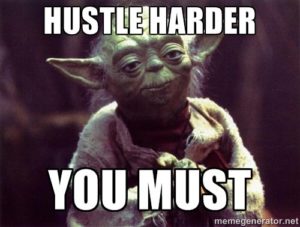I recently spoke to a full room of student entrepreneurs at a local university. I was asked to share my views as a business owner on my personal entrepreneurial journey mixed with some advice and lessons. One facet of my talk was on why I hate the use of the word “hustle” in business. It seems to be most prevalent in online marketing and technology companies, as well as the blogging community. In fact, I hear it so much and see it so often that I felt compelled to address my disdain for this over-used and over-hyped word in business. Ordinarily, Yoda could persuade me of just about anything, but alas, sorry Yoda. It’s a “hard NO” to hustlin’.
 Photo from memegenerator.net
Photo from memegenerator.net
Let me break it down…
I’ll start with the definition. At its most positive, hustle is described as “busy movement and activity” and at its most negative, it is “a fraud or swindle” (source: Wikipedia). I noticed that hustle is almost always used in a positive way when marketers and business people talk about taking action. They are referring to hard work, grit and tenacity. Unfortunately, all I ever envision when I see the word hustle is lots of fluff and little substance. It’s a glorification of that other awful term in business – busyness. It doesn’t actually mean anything. You can be hustling in your business, you can be busy, so, so busy, and yet accomplishing little. Hustle does equate to action (of some sort), but it doesn’t necessarily mean action that counts.
So what should you focus on?
I’d like to see business professionals stop telling new business owners and entrepreneurs who are trying to grow their businesses to get out there and hustle. It means nothing. Instead, what we should be focusing on is strategy. With a good strategy, we are better equipping entrepreneurs to take valuable action and reflect on that action so they can take even more valuable action in the future.
Replace hustle with strategy!
Here is what all businesses should include in their strategy (base level):
- Understanding Your Business – who are you, what do you do, who are your customers (and how do you know this), what is your unique selling proposition, what is your price point, how will you market your product
- Research – how can you support information about your product/needs, what is your market segment, what are industry standards
- Focus – how are you going to follow through on your strategy, this is the accountability piece
- Goals – what are your plans and aspirations for this year, next year, five years from now and how will you get there
- Steps and Processes – the details of how you will execute your plans, who is responsible, tracking results
- Evaluation Mechanisms – how will you measure success, what are the lessons learned, information is only useful if you are using it, what is the intelligence gained
I’m sure that the purpose of using the word hustle is not to abandon strategy altogether, but my concern is that new entrepreneurs will rely on the belief that hustling equates to success and that is simply not true. And, I’ve worked with enough new entrepreneurs to know that many see hustle as the road to success. Now that I’ve talked about it, I challenge you to think about your own relationship with the word hustle, whether you put too much emphasis on the word and if your strategy reflects the work needed to build a successful business.

